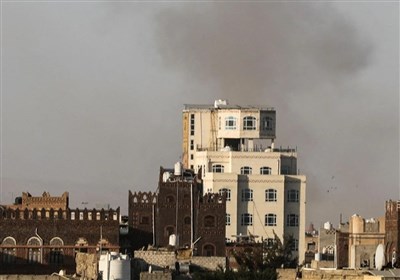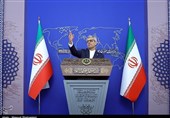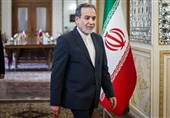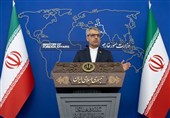Trump Waives Iran Nuclear Sanctions in What He Calls 'Last Chance' for JCPOA
TEHRAN (Tasnim) – US President Donald Trump has again waived sanctions against Iran that were lifted as part of the landmark 2015 nuclear deal between Tehran and world powers, the White House said Friday.
"Today, I am waiving the application of certain nuclear sanctions, but only in order to secure our European allies' agreement to fix the terrible flaws of the Iran nuclear deal," Trump said in a statement Friday, according to the Hill.
He added, "This is a last chance. In the absence of such an agreement, the United States will not again waive sanctions in order to stay in the Iran nuclear deal. And if at any time I judge that such an agreement is not within reach, I will withdraw from the deal immediately. No one should doubt my word."
The White House’s announcement Friday keeps alive for now an agreement that Trump has called the “worst deal ever negotiated” while trying project a continued hard-line stance against Tehran.
The decision also represents a win for national security adviser H.R. McMaster, Secretary of State Rex Tillerson and Defense Secretary James Mattis, who have all advised against walking away from the international agreement.
In October, Trump refused to certify to Congress that the deal is in the US national interest. The announcement did not kill the deal, though, as the certification is a requirement of US law, not the agreement itself.
But on Friday, Trump faced the first in a series of deadlines that could have killed the deal. The US sanctions that were lifted as part of the deal have to be waived every few months, and a failure to do so would essentially mean the United States was no longer following the accord.
The new sanctions announced Friday are against 14 people and entities for alleged human right abuses, censorship or weapons proliferation, an administration official told reporters.
The new designations include sanctions against the head of Iran’s judiciary, an Iranian prison, the director of the prison, the Islamic Revolution Guards Corps’ electronic warfare and cyber defense organization, and Iran’s supreme council for cyberspace.
In his October announcement, Trump also called on Congress for a legislative “fix” to address the issues he sees with the deal. Senate Foreign Relations Committee Chairman Bob Corker (R-Tenn.) has been working with the administration on the bill and has recently touted progress with Democrats and European allies.
Committee ranking member Ben Cardin (D-Md.), though, has indicated wide gaps continue to exist between Democrats and Republicans on the potential legislation.
An administration official told reporters Friday that the legislation must include four elements: a demand that Iran allow “timely, sufficient and immediate” inspections requested by the International Atomic Energy Agency; a requirement to remain above a one-year breakout time to achieving a nuclear weapon; an end to the sunset clauses by allowing the United States to immediately snapback sanctions if Iran restarts those activities; and state that US law views Iran’s missile program as “unacceptable.”
It’s unclear whether Congress and Europeans will heed Trump’s call. The terms of the legislation laid out by the administration Friday are similar to a framework released by Corker and Sen. Tom Cotton (R-Ark.) in October that Democrats dismissed as an unacceptable unilateral rewriting of the deal.
Administration officials have been meeting with European allies since the October announcement and have said progress has been made. But ahead of Trump's move, Britain, France and Germany agreed Thursday to reaffirm their support for the current deal.
“We want to protect the (deal) against every possible undermining decision whatever that may come,” German Foreign Minister Sigmar Gabriel said alongside his French and British counterparts and European Union foreign policy chief Federica Mogherini after meeting Iranian Foreign Minister Mohammad Javad Zarif. “It would send a very dangerous signal to the rest of the world if the only agreement that prevents the proliferation of nuclear weapons was negatively affected."
Wendy Sherman, the former under secretary of State for political affairs and the lead US negotiator of the nuclear deal, said in a conference call Friday that the Europeans would be unlikely to agree to a new deal with the US without the inclusion of other parties to the initial agreement, including Iran, China and Russia.
"I cannot imagine that any process that will go forward will exclude the other players in the initial deal," Sherman said.






